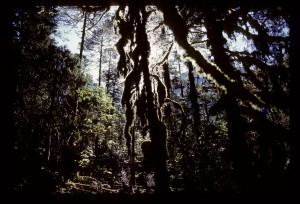Fryderyka Chopina: Nocturne, Opus 27, No. 2, Lento sostenuto, 1835. Just kidding about the spelling, although the Paderewski committee isn’t (see “Editions.”).
Listen to the full track
Listen to the author reading the text
NIGHT MUSIC
 When I think of Chopin’s Nocturnes I think of that despairing French photo, maybe by René-Jacques, when the world was in black and white and every kiss was a matter of life or death, coming just after the war when the universal instinct was to make love in the ruins, and Paris was in ruins, as were people, so I think of that photo of the night flying down some rain-soaked stairs to the dark dirty banks of the Seine, dank underworld highways of sex and failure which surround us in our trenchcoats, glistening in the rain, on the run from the night, like Aznavour in Shoot the Piano Player, losers with lamplit halos, lovers of lost color, of daylight and dead music, trapped in the steel of cities destroyed by their own technologies, by the engines of war, knowing that leaves have been dead in the countryside for months, that nothing will come of the spring, that first love is the beginning of betrayal, but still the camera flies down the Fritz Lang steps of the storm, holding back all that despair, the small rooms of the night, renounced by the vast clueless rage that moves the world, yet rhyming still the mesh of perfect marriages with dappled carriages, even though rhymes no longer matter to a society blown apart by weapons and the rain of rust, fog hurling itself around those filthy river walks where transvestites shiver in the litter, hoping even now that the chilling, stripping rain will bring auras to the streetlamps and that somewhere in the mist someone sings for real, all the decades of deceit ripped away, and there the photo stands, listening to night, waiting for morning, for the flirting, restorative day, aiming at tenderness despite the baggage of camp, the sniggers of the broken, strangifying and strangling the walking dumb, the busted, the aficionados disgusted with their own expertise, their inability to start over—it’s all there in that photo, in the music of night, the Kantian echo of black and white, where everything is either true or false, before philosophers started to dicker, to recant (as Freud, Jung, Sartre, and Eliot all did), too late as always, their doubts hushed by acolytes who were already profiting from their youthful mistakes: well, here’s Chopin’s rain again, washing out sores, and let’s hope it scours all of us.
When I think of Chopin’s Nocturnes I think of that despairing French photo, maybe by René-Jacques, when the world was in black and white and every kiss was a matter of life or death, coming just after the war when the universal instinct was to make love in the ruins, and Paris was in ruins, as were people, so I think of that photo of the night flying down some rain-soaked stairs to the dark dirty banks of the Seine, dank underworld highways of sex and failure which surround us in our trenchcoats, glistening in the rain, on the run from the night, like Aznavour in Shoot the Piano Player, losers with lamplit halos, lovers of lost color, of daylight and dead music, trapped in the steel of cities destroyed by their own technologies, by the engines of war, knowing that leaves have been dead in the countryside for months, that nothing will come of the spring, that first love is the beginning of betrayal, but still the camera flies down the Fritz Lang steps of the storm, holding back all that despair, the small rooms of the night, renounced by the vast clueless rage that moves the world, yet rhyming still the mesh of perfect marriages with dappled carriages, even though rhymes no longer matter to a society blown apart by weapons and the rain of rust, fog hurling itself around those filthy river walks where transvestites shiver in the litter, hoping even now that the chilling, stripping rain will bring auras to the streetlamps and that somewhere in the mist someone sings for real, all the decades of deceit ripped away, and there the photo stands, listening to night, waiting for morning, for the flirting, restorative day, aiming at tenderness despite the baggage of camp, the sniggers of the broken, strangifying and strangling the walking dumb, the busted, the aficionados disgusted with their own expertise, their inability to start over—it’s all there in that photo, in the music of night, the Kantian echo of black and white, where everything is either true or false, before philosophers started to dicker, to recant (as Freud, Jung, Sartre, and Eliot all did), too late as always, their doubts hushed by acolytes who were already profiting from their youthful mistakes: well, here’s Chopin’s rain again, washing out sores, and let’s hope it scours all of us.
In this most naked of confessions entrusted over the masking river swell of warm certainty where the conclusion of the right hand is as affirming as the left, what moves me are the harmonies sprung out of older leftovers, new subtleties invented from already dying notes, cascading and spiraling stairways entirely independent of rhythm, the busy demands of reality overcome with invention, the right hand in its own world, anchoring itself just in time in the river on the bottom, the gently flowing Danube of the salons never descending into those embarrassing gallery-opening clichés, keeping its own company and consequently its timelessness: never imitated, never solved, still hanging, small fragile scents in the summer air, too personal to become a slogan, a motto, a movement, too inner to be a theme.
 Chopin was never part of a school, a group, which explains perhaps his inability to be explained, uncovered, espoused, exposed, exhumed. No defense is the best defense, as grass bends to wind, as someone said of Chopin: flowers and cannons, where chords are as indefinable as clouds, too airy to be earthy; where tonality defies reduction—to clarify it is to ruin it, the way roads destroy the delicate tapestry of fields, the way a flashlight illuminates the obvious and erases the subtle, diminishing as it enlarges. Let me become hysterical here.
Chopin was never part of a school, a group, which explains perhaps his inability to be explained, uncovered, espoused, exposed, exhumed. No defense is the best defense, as grass bends to wind, as someone said of Chopin: flowers and cannons, where chords are as indefinable as clouds, too airy to be earthy; where tonality defies reduction—to clarify it is to ruin it, the way roads destroy the delicate tapestry of fields, the way a flashlight illuminates the obvious and erases the subtle, diminishing as it enlarges. Let me become hysterical here.
Musicians often keep pictures or stories in their minds to help them capture the mood they want, or conversely capture the mood by ignoring the piece, a bit like inner tennis where a mantra’s purpose is to distract the player so the body can go about its business, that is, play it straight. So we by indirections find directions out. But to what extent do our inner programs, rather than distracting us, focus us on the programs themselves, which then replicate in the music, as if Marilyn Monroe, while pretending to be a peach to forget her fear, actually became a peach?
Here in the Nocturne, from the start to the end, the constant bass notes descend like snow on a quiet Swiss village, while the melody imitates that bass with exactly the same notes, give or take a few, so that you can see Chopin in the process of inventing his melody from his accompaniment, the way Michelangelo said he found his sculptures by chipping away the stone that didn’t belong to them. But maybe I am just snow-blind.

